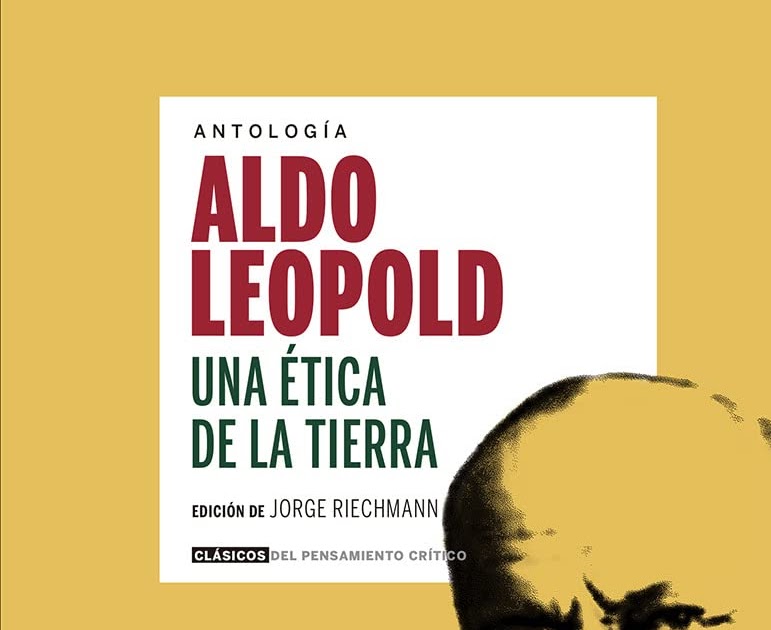
Original Language: English
Títutulus original: A Sand County Almanac
Translation: Jorge Riechmann
Year of publication: 1949
Valoración: Essential
“There are times when progress is reactionary, and the reactionary is progressive.” Arthur Schopenhauer
A few years ago I saw an interview with Ernesto Sábato in the “Thoroughly” program, still made many years ago, in black and white. In addition to being one of my favorite writers, in that interview Sábato said something that returns to memory every time I contemplate, from the window of my office, a saturated landscape of buildings:
“Today, lift buildings with thirty floors to live in those armed cement cubicles and air conditioning children who will never see the birth of a dog, nor will they contemplate the appearance of the sun or moon; Children destined to become future drug addicts, alienated and sad, it is not progress. The revolutionary today would be to propose the abolition of skyscrapers.”
A phrase of the book that review here caused the same feeling of urgency I experienced when listening to Sábato:
“I met a lady with studies, possessor of the award PHI Beta Kappa, who told me that I had never seen or heard the geese who, twice a year, announce the cycle of the stations when passing over their well isolated roof. Is education nothing more than a way of changing an awareness alert for things of less value? The goose that tries such a barter will soon become a lot of feathers.”
These two statements, from two “reactionaries” of their respective times, provide us with the essence of this book, which, although published several decades ago, remains surprisingly current. This is not only due to the obvious wave of irrationality that permeates developed societies (without suggesting that other nations are free of this trend, but highlighting that the former possess the power to inflict greater damage), but also because of the urgent need for individual reflection on different planes: our role in the community, our lifestyle, human becoming and coexistence with other life forms.
Considered the father of ecological ethics, Aldo Leopold, forestry engineer by profession, exposes in this book key aspects of his intellectual and emotional relationship with the environment. Through personal experiences, deep reflections derived from its direct contact with nature, and an appreciation of rural life, Leopold introduces us to the roots of conservation and protectionist thought, culminating in a philosophical legacy that would lay the foundations for the environmental movements of the second half of the twentieth century until today.
The book is structured in three clearly differentiated parts:
1. An Arenous County Almanac. This section collects the tests originally published under the title “A Sand County Almanac”. It is divided into twelve parts, one for each month of the year, and offers an almost poetic description of the passing of the semi-salvage life that Leopold carried in his Wisconsin farm. Particularly remarkable is its narrative about the time seen through the growth rings of a tree as the mountain range passes through them. This section is undoubtedly the most lyrical and impressionist, the most intimate and evocative of the book.
2. Sketches from here and there. This second section presents reflections born from the author’s trips and observations in various regions of North America. Leopold describes in detail different ecosystems, showing how human impact alters natural balance. We can see firsthand the episodes that molded Leopold’s ideas. The tests here contain not only invite us to assess the beauty of various landscapes, but also confront the fragility and vulnerability of natural environments before human activity. It is noteworthy every time that Leopold questioned, regretted and condemned the actions he did when young.
3. An ethic of the earth. In the last part of the book, Leopold exposes his most philosophical and ideological approaches, clearly developing the central concept of his work: the “Earth’s ethics.” Here the author argues that the human being must abandon his dominant and exploiting attitude towards nature to adopt a perspective of respect and community. Leopold persuasively argues the need to establish an ethic that considers the Earth not only as a resource, but as a community to which we belong and on which we depend.
An ethic of the Earth is an essential book, not only for its literary quality or its historical value, but because its reflections transcend time, becoming an urgent call to rethink our relationship with the environment. The validity of Leopold lies in having anticipated the ecological and ethical challenges that we face today with increasing urgency. Not to mention that it is a foundational and reference work for anyone who is interested in rethinking the impact of their passage through the world.
Source: https://unlibroaldia.blogspot.com/2025/08/aldo-leopold-un-etica-de-la-tierra.html


